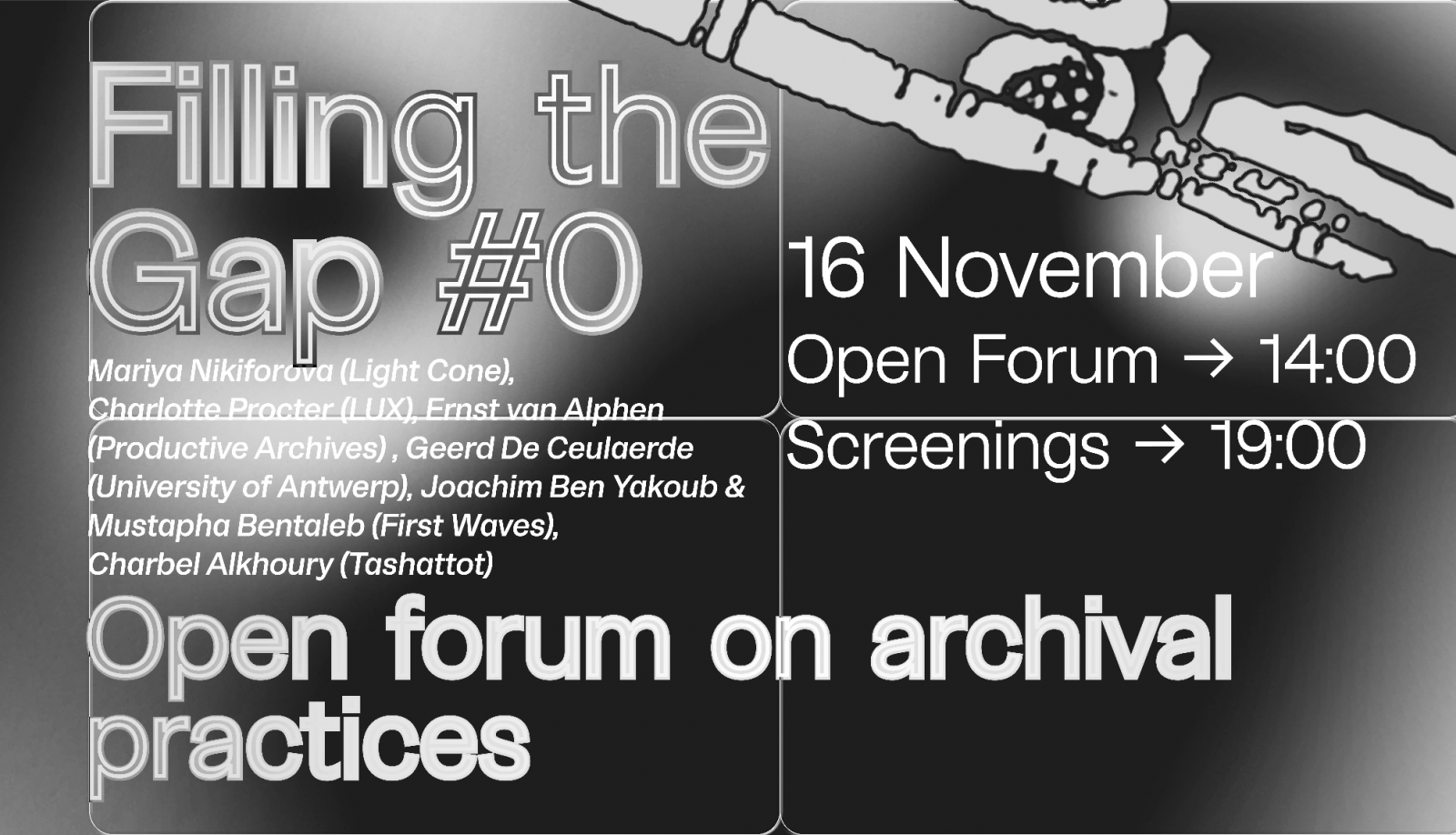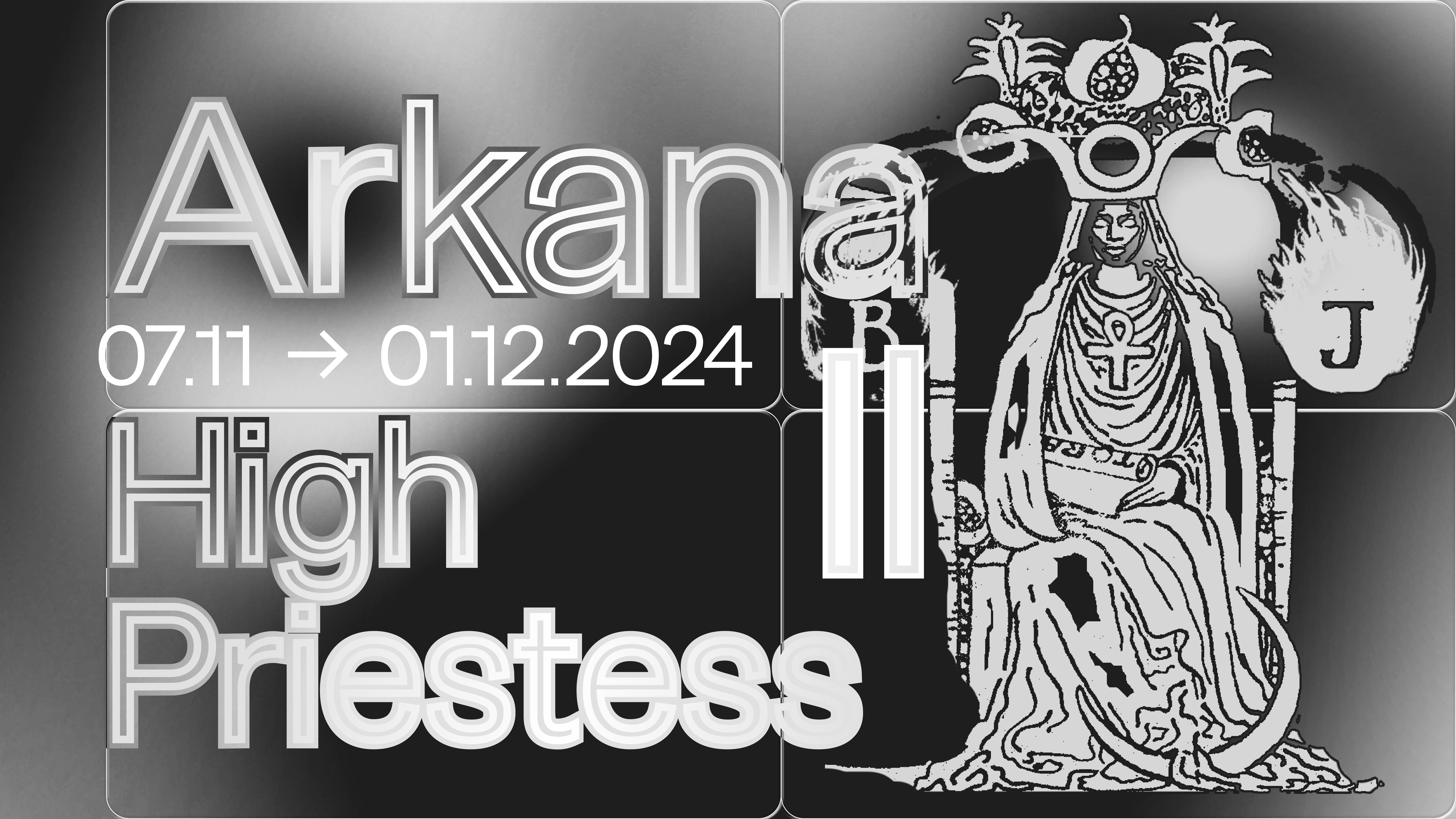Open forum on archival practices: ‘Filling the Gaps #0'

Tabula Rasa unfolds in three parts, three Arkanas, that are represented by a tarot card. The second Arkana is under the spell of The High Priestess that is linked with hidden knowledge and which calls to 'go deep'. This card will guide us in exploring and revealing (un)preserved archives. The High Priestess draws wisdom from inner reflections and unseen realms to uncover hidden truths.
With the open forum Filling the Gaps #0, argos is launching an essential exploration of archival practices and the dynamics that shape them. Inspecting the notion of “gaps” in archives by looking at artists and artworks that have been highlighted or excluded, overshadowed and forgotten, we aim to uncover new ways of understanding cultural memory and identity. Seven guest speakers encourage us to view these gaps as spaces for fresh perspectives and untold stories. A special film screening curated by the speakers rounds up the day.
With Ernst van Alphen (editor Productive Archiving), Geerd De Ceulaerde (University of Antwerp), Mariya Nikiforova (Light Cone, Paris), Joachim Ben Yakoub & Mustapha Bentaleb (www.firstwaves.be), Charbel Alkhoury (Arab Image Foundation, Tashattot collective), Charlotte Procter (LUX, London3)
Schedule
13:30 - welcome
14:00 - open forum with Ernst van Alphen and Geerd De Ceulaerde
15:00 - break
15:15 - conversations with Mariya Nikforova, Charbel Alkhoury, Joachim Ben Yakoub, Mustapha Bentaleb, Charlotte Procter
18:00 - break
19:00 - film screening
About the participants
Geerd De Ceulaerde is since 2014 Head
Archivist at Herentals City Archives, gradually transforming this
institution into a proactive, socially oriented institution. From the
encountering of both paradigmatic and practical challenges along the
way, these experiences led in 2022 to an invitation from the University
of Antwerp for doctoral research, from a critical heritage studies’
perspective, on the role and position of archives in society and the
broader heritage arena. Since then, balancing roles as a researcher at
the University of Antwerp on archival and heritage studies and as a
practitioner within the field.
Geerd De Ceulaerde is engaged in a long-term, in-depth research into how to question 'authorised' archival discourses. How can an organisation holding an archive step out of its comfort zone and challenge itself? We asked him to share with us his experience and some of the insights gained from his research.
Ernst van Alphen is a cultural analyst and professor emeritus of Literary Studies at Leiden University. He is the editor of Productive Archiving: Artistic Strategies, Future Memories, and Fluid Identities. His
main research interests are visual and cultural studies, Holocaust
studies, and gender studies. He has also written extensively on modern
and contemporary art and literature.
Ernst van Alphen will give us a synthesis of the points he develops in the introduction to the book Productive Archiving: Artistic Strategies, Future Memories & Fluid Identities. His focus is on issues that are usually overlooked by organisations holding an archive: the question of inclusion in or exclusion, the loss of individuality in the archive, the risk of homogenization, and the potential threat of archiving developing into a form of pigeonholing, restricting specific identities into confined categories.
Mariya Nikiforova is a film programmer, filmmaker,
and researcher. After studying at Emerson College in Boston, she
obtained a Master’s degree from the Sorbonne-Nouvelle University (Paris)
in 2016, with a research project on artist-run photochemical film
laboratories. She is a member of the laboratory Navire Argo
(L’Abominable), where she has completed several short films. Since 2018,
she is also Collection Manager at Light Cone (Paris), an organization
dedicated to the distribution of experimental cinema.
Light Cone's collection includes approximately 6,000 films made by over 800 filmmakers. Many of these films are regularly rented out to cinemas, festivals, museums and universities, circulating globally. There are, however, films that are rarely rented, remaining largely unknown to both programmers and the public. Mariya Nikiforova will tell us about a project she worked on, aimed at bringing these forgotten films to light.
Charbel Alkhoury, a Beirut-born artist and cultural practitioner currently based in Brussels, navigates the complex interplay of memory, identity, and urban transformation through his projects. With a background in photography and multimedia, as well as a master's degree in fine arts, he delves into the multifaceted narratives of cities, particularly Beirut, where past and present converge. His work, often expressed through photography and video installations, challenges viewers to contemplate the impact of history, upheaval, and displacement on both physical landscapes and personal psyches.
Charbel will present the Arab Image Foundation archive, where he worked for four years, sharing insights into its practices, functions, and approach to preserving cultural heritage amid Lebanon's political unrest. He will also showcase some of his personal and recent archival projects, highlighting how his work at the AIF has influenced his artistic practice.
Joachim Ben Yakoub is a cultural worker, writer and
teacher, sometimes operating as curator and dramaturg, working on the
border of different art schools and institutions. He works in the
Kitchen, a collective study and workspace in Brussels and is part of the
Collectif Mémoire & Histoire. He is facilitating research at ERG
(École de Recherche Graphique) in Brussels and is affiliated with SLARG,
a research group at Sint Lucas School of Arts in Antwerp, where he also
teaches.
Mustapha Bentaleb is an electrical engineer by profession and a long-standing community activist. He has worked with many civic organisations and was often involved with associations of the first generation of Moroccan workers in Brussels. He helped found the Espace Magh Maghreb cultural centre and the Center for Archives and Research on the History of Maghreb and Arab Immigration (CARHIMA). More recently, he initiated the exhibition ‘Complément d'histoire’ and the Mémoire & Histoire collective, carefully safeguarding the Maghrebi militant memory in Brussels.
Joachim Ben Yakoub and Mustapha Bentaleb present First Waves, a collaborative open platform dedicated to the memorial restitution of the Magrhebi and black diasporas in Belgium. Recorded testimonies, archival materials and oral histories resurface through the efforts of several collectives, and paint a clear picture of early waves of dissent in Belgium
Charlotte Procter is an archivist and curator, Collection & Archive Director at LUX and a member of the Cinenova Working Group - a volunteer collective dedicated to preserving and promoting the feminist film and video archive, Cinenova. She has collaborated on international research, preservation, and curatorial projects and continues to engage in collaborative work that foregrounds and questions the historicisation and distribution of radical media.
Charlotte Procter will discuss working with a number of collections, addressing gaps and exploring new contexts through dialogues with contemporary artists or connections to local communities and political struggles. One notable project was developed by LUX in 2019 with the London Community Video Archive (LCVA), an organisation founded in 2016 to preserve and share community videos from 1970s and 1980s London and the South East. Through this collaboration, LUX and the LCVA presented videos from the archive selected by local community and activist groups.
schedule
13:30 doors
14:00 open forum
19:00 screening programme
Film programme in the evening:
Impro. Un été Bruxellois (1998) Jos de Gruyter, video, 20'05''
Comment filmer Molenbeek? (1994) Franciska Lambrechts & Johan Grimonprez, Super8 on video, 5’
Roadworks (1985) Mona Hatoum, video, 6’43”
Excerpt from All Work and No Pay (1976) London Community Video Archive, video, 10’
PopG Clanc (2023) Charbel Alkhoury & Monica Basbous, video, 20’21
Self-Fulfilling Prophecy (1994) Monika Schwitte, 16mm, silent, 1' 50
Selbstportait (1995) Eva-Marie Schmid 16mm, silent, 3' 00
Systema (1984) Françoise Thomas, 16mm, sound, 4' 00
Chromaticité I (1977) Patrice Kirchhofer, 16mm, sound, 11' 25

